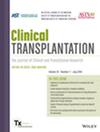Travel Practices and Associated Risks in Adult Thoracic Transplant Recipients: A Monocentric Survey
Abstract
Background
Little is known regarding the travel practices of thoracic organ transplant recipients and their potential associated morbidity.
Methods
A questionnaire was distributed to thoracic organ transplant recipients to capture demographics, risk perception, knowledge regarding vaccination, history of travel outside metropolitan France, pre-travel advice, health issues during travel outside Europe, and travel intentions in the following year. Comparisons were performed between travelers and non-travelers through univariable then multivariable logistic regression.
Results
134 patients completed the survey (72% lung, 11% heart, and 17% heart–lung transplant recipients). Twenty-four percent considered themselves at moderately to significantly increased risk of travel-related health issues. Sixty-two patients (47%) had traveled outside metropolitan France. Among 29 subjects who had traveled outside Europe, 22 had received pre-travel advice. Among 62 respondents who had traveled outside metropolitan France, 6 (10%) experienced health issues (all outside Europe), which led to consultation in three cases and hospitalization in one case. Among 117 respondents, 68 (58%) intended to travel within the following year, and 57 (84%) to seek medical advice before departure, predominantly from their transplant physician. In multivariable analysis, being a lung transplant recipient and higher education level were associated with travel outside Europe. The time post-transplantation was longer for all types of travel, when compared to non-travelers.
Conclusions
Almost half of adult thoracic transplant recipients had traveled outside metropolitan France, 22% outside Europe, and 10% of travelers experienced health issues. The suboptimal preparation of these patients underlines the potential benefits of closer interaction between travel medicine specialists and transplant physicians.


 求助内容:
求助内容: 应助结果提醒方式:
应助结果提醒方式:


